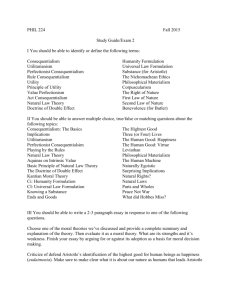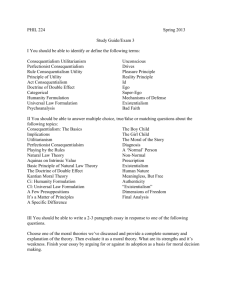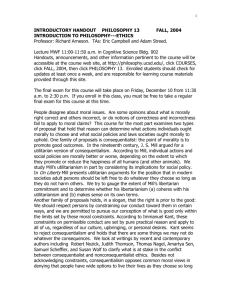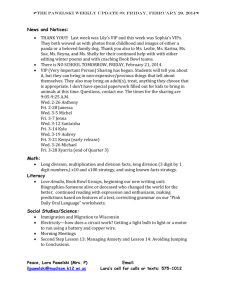Ethical Theory
advertisement
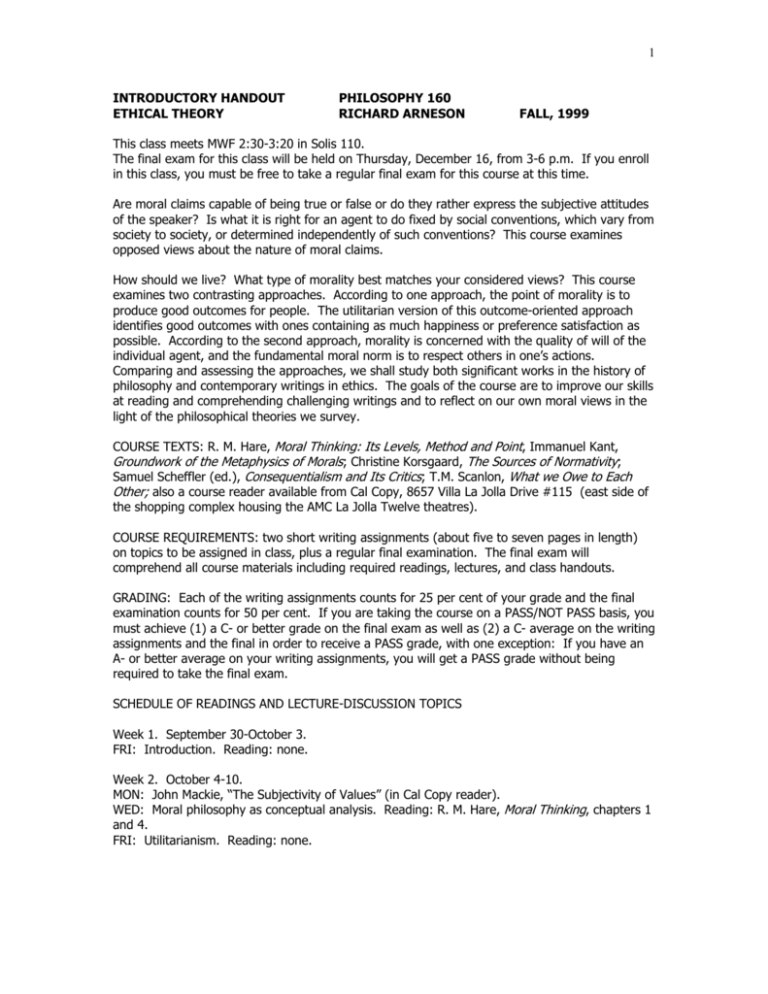
1 INTRODUCTORY HANDOUT ETHICAL THEORY PHILOSOPHY 160 RICHARD ARNESON FALL, 1999 This class meets MWF 2:30-3:20 in Solis 110. The final exam for this class will be held on Thursday, December 16, from 3-6 p.m. If you enroll in this class, you must be free to take a regular final exam for this course at this time. Are moral claims capable of being true or false or do they rather express the subjective attitudes of the speaker? Is what it is right for an agent to do fixed by social conventions, which vary from society to society, or determined independently of such conventions? This course examines opposed views about the nature of moral claims. How should we live? What type of morality best matches your considered views? This course examines two contrasting approaches. According to one approach, the point of morality is to produce good outcomes for people. The utilitarian version of this outcome-oriented approach identifies good outcomes with ones containing as much happiness or preference satisfaction as possible. According to the second approach, morality is concerned with the quality of will of the individual agent, and the fundamental moral norm is to respect others in one’s actions. Comparing and assessing the approaches, we shall study both significant works in the history of philosophy and contemporary writings in ethics. The goals of the course are to improve our skills at reading and comprehending challenging writings and to reflect on our own moral views in the light of the philosophical theories we survey. COURSE TEXTS: R. M. Hare, Moral Thinking: Its Levels, Method and Point, Immanuel Kant, Groundwork of the Metaphysics of Morals; Christine Korsgaard, The Sources of Normativity; Samuel Scheffler (ed.), Consequentialism and Its Critics; T.M. Scanlon, What we Owe to Each Other; also a course reader available from Cal Copy, 8657 Villa La Jolla Drive #115 (east side of the shopping complex housing the AMC La Jolla Twelve theatres). COURSE REQUIREMENTS: two short writing assignments (about five to seven pages in length) on topics to be assigned in class, plus a regular final examination. The final exam will comprehend all course materials including required readings, lectures, and class handouts. GRADING: Each of the writing assignments counts for 25 per cent of your grade and the final examination counts for 50 per cent. If you are taking the course on a PASS/NOT PASS basis, you must achieve (1) a C- or better grade on the final exam as well as (2) a C- average on the writing assignments and the final in order to receive a PASS grade, with one exception: If you have an A- or better average on your writing assignments, you will get a PASS grade without being required to take the final exam. SCHEDULE OF READINGS AND LECTURE-DISCUSSION TOPICS Week 1. September 30-October 3. FRI: Introduction. Reading: none. Week 2. October 4-10. MON: John Mackie, “The Subjectivity of Values” (in Cal Copy reader). WED: Moral philosophy as conceptual analysis. Reading: R. M. Hare, Moral Thinking, chapters 1 and 4. FRI: Utilitarianism. Reading: none. 2 Week 3. October 11-17. MON: Intuitive and critical moral thinking. Reading: Hare, Moral Thinking, chapters 2-3. WED: Hare’s preference utilitarianism. Reading: Hare, Moral Thinking, chapters 5-7. FRI: Preference utilitarianism—for and against. Reading: Richard Brandt, "The Criticism of Pleasures and Intrinsic Desires," Peter Railton, "Facts and Values," and Richard Kraut, “Desire and the Human Good” (all in Cal Copy reader). Week 4. October 18-24. MON: Hare versus objections against utilitarianism. Reading: Hare, Moral Thinking, chapters 89; also John Rawls, “Classical Utilitarianism,” in Scheffler, Consequentialism and Its Critics. WED: What, if anything, makes one morality better than another. Reading: Hare, Moral Thinking, chapters 10-12. FRI: Kant’s ethics. Reading: Immanuel Kant, Groundwork, Section I. Week 5. October 25-31. MON: Dignity and moral worth. Reading: Kant, Groundwork, Section I. WED: The categorical imperative. Reading: Kant, Groundwork, Section II. FRI: Skepticism about the categorical imperative. Reading: Philippa Foot, “Morality as a System of Hypothetical Imperatives” (in Cal Copy reader). Week 6. November 1-7. MON: Universalization. Reading: Kant, Groundwork, Section II; also Christine Korsgaard, "Kant's Formula of Universal Law" (in Cal Copy reader). WED: Not treating people as mere means. Reading: Kant, Groundwork, Section II; also Onora O’Neill, “Between Consenting Adults,” and Thomas Hill, “Humanity as an End in Itself” (both in Cal Copy reader). FRI: [FIRST WRITING ASSIGNMENT DUE.] Kant’s rigorism. Reading: Christine Korsgaard, “The Right to Lie: Kant on Dealing with Evil” (in Cal Copy reader). Week 7. November 8-14. MON: Morality, autonomy, and free will. Reading: Kant, Groundwork, Section III; also Thomas Nagel, “Moral Luck” (in Cal Copy reader). WED: Rights-based consequentialism. Robert Nozick, “Side Constraints,” and Amartya Sen, “Rights and Agency,” sections 1-4 (both in Scheffler, Consequentialism and Its Critics). FRI: A critique of consequentialism. Reading: Bernard Williams, “Consequentialism and Integrity,” in Scheffler, Consequentialism and Its Critics. Recommended reading: Sen, “Rights and Agency,” sections 5-7, in Scheffler, Consequentialism and Its Critics. Week 8. November 15-21. MON: Response to Williams; more on integrity. Reading: Peter Railton, “Alienation, Consequentialism, and the Demands of Morality,” in Scheffler, Consequentialism and Its Critics. WED: Nonconsequentialism. Reading: Thomas Nagel, “ Autonomy and Deontology,” in Scheffler, Consequentialism and Its Critics; Elizabeth Anderson, “An Expressive Theory of Rational Action” (in Cal Copy reader). FRI: Do moral claims have binding authority? Reading: Christine Korsgaard, The Sources of Normativity, Lectures 1 and 2. 3 Week 9. November 22-28. MON: A Kantian account of the authority of morality. Reading: Korsgaard, The Sources of Normativity, Lectures 3 and 4. WED: Conclusion of Korsgaard discussion. Reading: none required. Recommended reading: the responses by GA Cohen, Raymond Geuss, Thomas Nagel, and Bernard Williams, along with Korsgaard’s reply, in The Sources of Normativity. FRI: THANKSGIVING HOLIDAY. Week 10. November 29-Dec 5. MON: Scanlon’s contractualism. Reading: Scanlon, What We Owe to Each Other, chapters 1 and 2. WED: Well-being deconstructed. Reading: Scanlon, What We Owe to Each Other, chapter 3. FRI: Contractualism. Reading: Scanlon, What We Owe to Each Other, chapters 4 and 5. Week 11. December 6-12. MON: [SECOND WRITING ASSIGNMENT DUE.] More on contractualism. Reading: same as for last Friday; also Philip Pettit, “A Consequentialist Response to Scanlon's Contractualism” (in Cal Copy reader). WED: Responsibility and free will. Reading: Scanlon, What we Owe to Each Other, chapter 6. FRI: Relativism, subjectivism, and skepticism about morality. Reading: Scanlon, What we Owe to Each Other, chapter 8. Arneson’s office hours: Tuesdays 2-3 and Thursdays 1-3 in HSS 8057. Email: rarneson@ucsd.edu Office phone 534 6810
